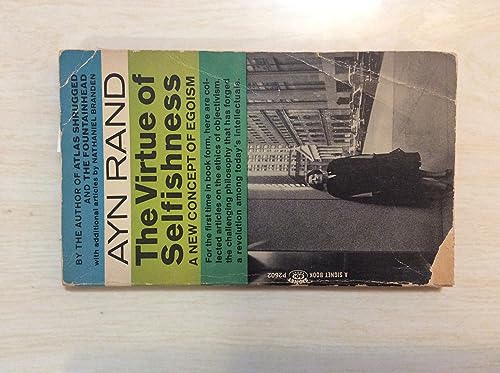A Fresh Perspective on Egoism: The Value of Selfishness
The Virtue of Selfishness: A New Concept of Egoism is a groundbreaking and controversial book written by renowned philosopher and novelist Ayn Rand. In this collection of essays, Rand argues that selfishness, when properly understood and practiced, is not a vice, but a virtue. She challenges traditional moral beliefs that selflessness and altruism are the highest moral virtues, putting forth the idea that individuals should prioritize their own rational self-interest above all else. Through her unique and provocative perspective, Rand encourages readers to reevaluate their beliefs about ethics and morality, inviting them to consider the benefits of embracing a more self-interested approach to life. This book is a challenging and thought-provoking read that aims to bring about a new understanding of egoism and its role in shaping individual happiness and success.




The Virtue of Selfishness: A New Concept of Egoism Plot Summary
The Virtue of Selfishness: A New Concept of Egoism is a collection of essays written by renowned philosopher and novelist Ayn Rand. Published in 1964, the book presents Rand’s philosophy of Objectivism, which includes the belief that rational self-interest is the highest moral purpose.
The book is divided into two sections: “The Objectivist Ethics” and “Man’s Rights.” In “The Objectivist Ethics,” Rand argues that the ultimate moral code is based on the idea of selfishness as a virtue. She asserts that each individual’s primary goal in life should be their own well-being and happiness, and that this pursuit of self-interest is both natural and moral.
Rand asserts that selfishness is not only rational but also necessary for human flourishing. She believes that individuals must pursue their own self-interest in order to achieve their full potential and be truly happy. The pursuit of self-interest, according to Rand, is inherently moral because it leads to the betterment of oneself and ultimately benefits society as a whole.
In “The Objectivist Ethics,” Rand also addresses the concept of altruism, which she sees as a destructive force that negates individual rights and suppresses human potential. She argues that altruism is inherently irrational, as it requires individuals to sacrifice their own values and goals for the sake of others. Rand believes that altruism is a form of self-sacrifice that ultimately leads to resentment and unhappiness.
In the second section of the book, “Man’s Rights,” Rand explores the concept of individual rights and their importance in a free society. She argues that individuals have the right to pursue their own self-interest and that this right should be protected by the government. Rand believes that individual rights are essential for the protection of human freedom and dignity.
Rand’s philosophy of Objectivism has been controversial and polarizing since its inception. Critics argue that Rand’s emphasis on selfishness is dangerous and promotes a dog-eat-dog mentality that undermines social cooperation and empathy. However, Rand’s supporters see her philosophy as a powerful defense of the individual against the encroachments of collectivism and government interference.
Throughout The Virtue of Selfishness, Rand presents a compelling argument for the moral value of selfishness and the importance of individual rights. She challenges conventional wisdom and advocates for a radical rethinking of morality based on reason and self-interest.
In conclusion, The Virtue of Selfishness: A New Concept of Egoism is a thought-provoking and controversial work that continues to spark debate and discussion to this day. Whether one agrees or disagrees with Rand’s philosophy, it is undeniable that her ideas have had a significant impact on the fields of ethics and political philosophy. Love her or hate her, Ayn Rand remains a figure of great influence and controversy in the world of ideas.
The Virtue of Selfishness: A New Concept of Egoism Key Takeaway
One key takeaway from Ayn Rand’s book “The Virtue of Selfishness: A New Concept of Egoism” is the idea that selfishness is not inherently negative or immoral. Rand argues that selfishness, when properly understood as rational self-interest, is actually a virtue that is essential to human flourishing.
Rand believes that individuals should prioritize their own happiness and well-being above all else, and that attempting to sacrifice oneself for the sake of others is ultimately harmful and counterproductive. She argues that selflessness is a form of self-sacrifice that devalues one’s own life and limits one’s potential for success and fulfillment.
According to Rand, acting in one’s own self-interest is not only moral, but also beneficial to society as a whole. When individuals are free to pursue their own goals and desires without interference, they are able to contribute their talents and abilities to society in a way that benefits everyone.
Overall, The Virtue of Selfishness challenges conventional notions of altruism and selflessness, and presents a compelling argument in favor of rational self-interest as a moral and virtuous value. Rand’s ideas may be controversial, but they offer a thought-provoking perspective on the nature of ethics and human behavior.
Conclusion
In conclusion, “The Virtue of Selfishness: A New Concept of Egoism” by Ayn Rand presents a compelling argument for the idea of rational egoism and the importance of putting oneself first. Rand argues that true selfishness is not about exploiting or harming others, but rather about pursuing one’s own rational self-interest as a moral obligation. She challenges traditional notions of selflessness and altruism, asserting that individuals should be free to act in their own self-interest without guilt or shame.
Overall, the book provides a thought-provoking perspective on the concept of selfishness and how it can be a virtue when approached from a rational and ethical standpoint. Readers who are interested in exploring ethical egoism, objectivism, and individualism will find this book to be a fascinating and insightful read.
I would recommend this book to anyone looking to challenge their preconceived notions of selfishness and altruism, as well as those interested in exploring the intersection of ethics, philosophy, and self-interest. It is a thought-provoking read that will spark important conversations and reflections on the nature of morality and individualism.

No responses yet